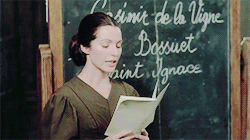crimsonliutenitsa:└Charlotte Brontë was the third of the six Bronte childrenHer dearest ambition was
crimsonliutenitsa:└Charlotte Brontë was the third of the six Bronte childrenHer dearest ambition was to be a writer. From a very young age she and her brother Branwell had collaborated in writing poetry and stories set in their imaginary world of Angria, and they were prolific, Charlotte claiming later that she had written more before the age of 13 than afterwards. In 1846 Charlotte persuaded her sisters to publish Poems by Currer Ellis and Acton Bell (the sisters’ androgynous pseudonyms). This was a commercial disaster, selling only two copies, but by the end of 1847 the first novels of all three sisters had been published, and Charlotte’s Jane Eyre was an immediate success. Following the publication of Shirley in 1849, the public knew her identity, and Charlotte became a celebrity in literary circles, something which the publication of Villette (1853) only enhanced. She.died in the early stages of pregnancy on March 31, 1855.└Emily Brontë was the fifth of the six Brontë children.Like her sisters and brother Branwell Emily was a writer from the time she could read. She collaborated with Anne in writing poetry and stories for their imaginary world of Gondal. Only a few poems from the Gondal sagas survive, but we know their collaboration continued until the early 1840s - it is possible Emily never abandoned her imaginary world. She was the least willing to agree to Charlotte’s publication of Poems by Currer, Ellis and Acton Bell (1846), and even after the publication of Wuthering Heights (1847), she refused to accompany her sisters to London and reveal the true identity behind her nom de plume Ellis Bell.We know she liked ‘military good order’ in her life, and also that she blended reality and fantasy in equal measure. She adored the family pets, yet had a violent temper, and disciplined them harshly. She avoided everyone outside the family, yet the characterisations in her novel are acutely observed.She died on December 19, 1848, on the sofa in the dining-room, unable any longer to ascend the stairs to her bedroom.└Anne Brontë was the youngest of the six Brontë children, and only 20 months old when her mother died in September 1821.She worked as a governess in two households: the Ingham family of Blake Hall, near Mirfield (1839-40), and the Robinson family of Thorp Green, near York (1840-45). She found the work lonely and demoralising, alleviated only by her annual holiday with the Robinson family.As did her sisters and her brother, Anne wrote stories and poetry from an early age. She was also, of course, one of the contributors to Poems by Currer, Ellis and Acton Bell (1846), and had two novels published: Agnes Grey (1847), which deals with the plight of the family governess, and The Tenant of Wildfell Hall (1848), which examines the consequences of married women’s lack of legal rights.A fortnight after Emily’s death Anne was also diagnosed as suffering tuberculosis. She wanted above all to see the sea again at Scarborough, and in May 1849, accompanied by Charlotte and their friend Ellen Nussey, Anne arrived there on May 25, 1849, and died there three days later.└Branwell Brontë was the fourth of the six Brontë children and the only boy.Branwell was a willing scholar with a precocious intellect. His translations of Horace’s Odes were to receive critical acclaim; he played the organ in his father’s church, and he aspired to being a professional portrait painter. Physically small with flaming red hair, Branwell was impulsive and quick-witted, and loved showing off in company.From the age of nine until adulthood Branwell and Charlotte collaborated in the creation of their imaginary world Angria, its topography, politics, wars, and large cast of exotic characters. They made little books from their stories. Branwell sent written work for publication or critical judgement to writers or publications he admired, including Blackwood’s Magazine, Wordsworth, De Quincey and Hartley Coleridge. His only published work was a handful of poems in YorkshOver the three years after he had been sacked from Thorp Green, Branwell sank into self-pity, became dependent on alcohol and opium, and was probably unaware his sisters had had their first novels published.. Branwell became ill, probably from tuberculosis, in summer 1848, and died on September 24. [x] -- source link
Tumblr Blog : crimsonliutenitsa.tumblr.com
#anne bronte#charlotte bronte#emily bronte







